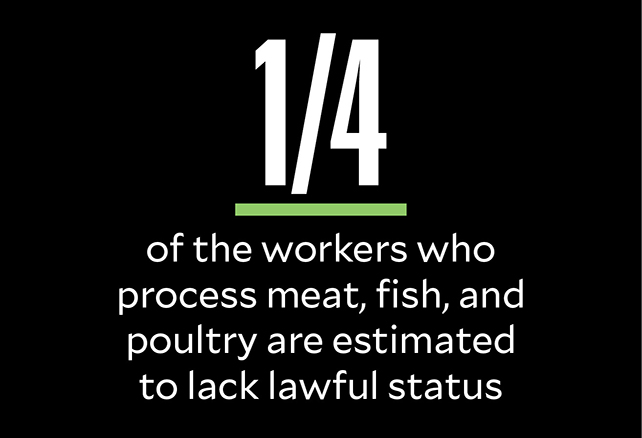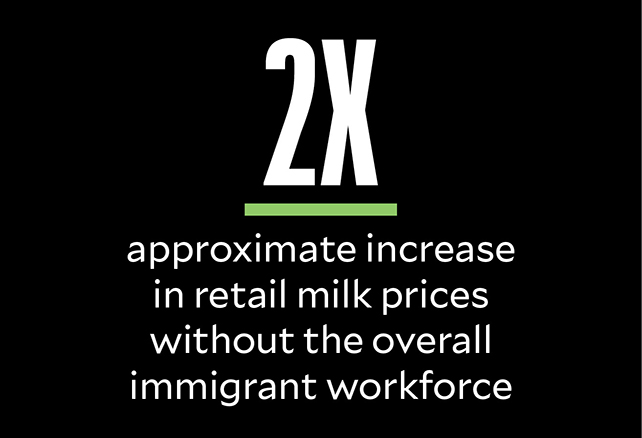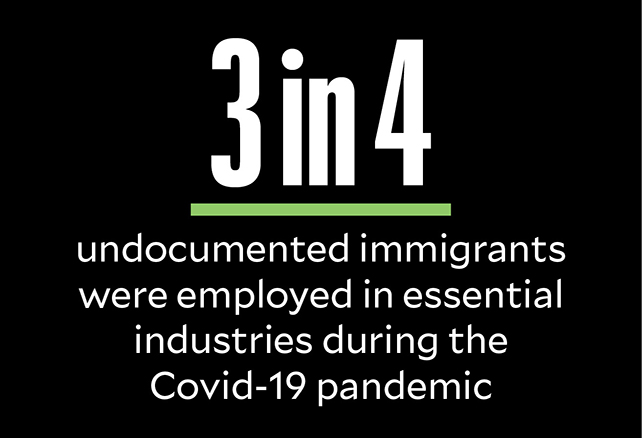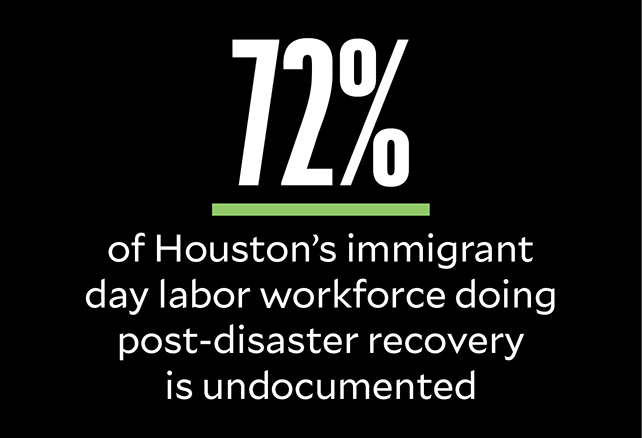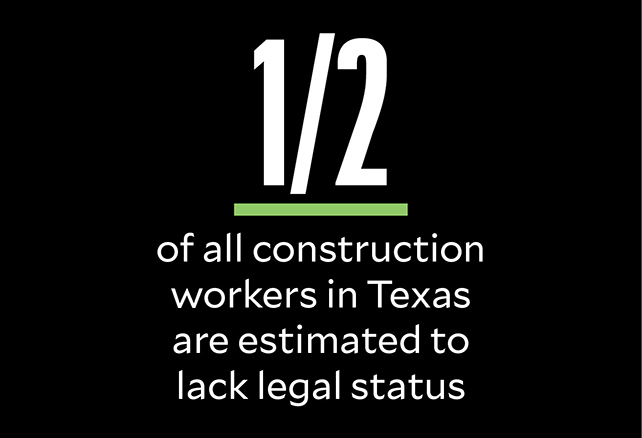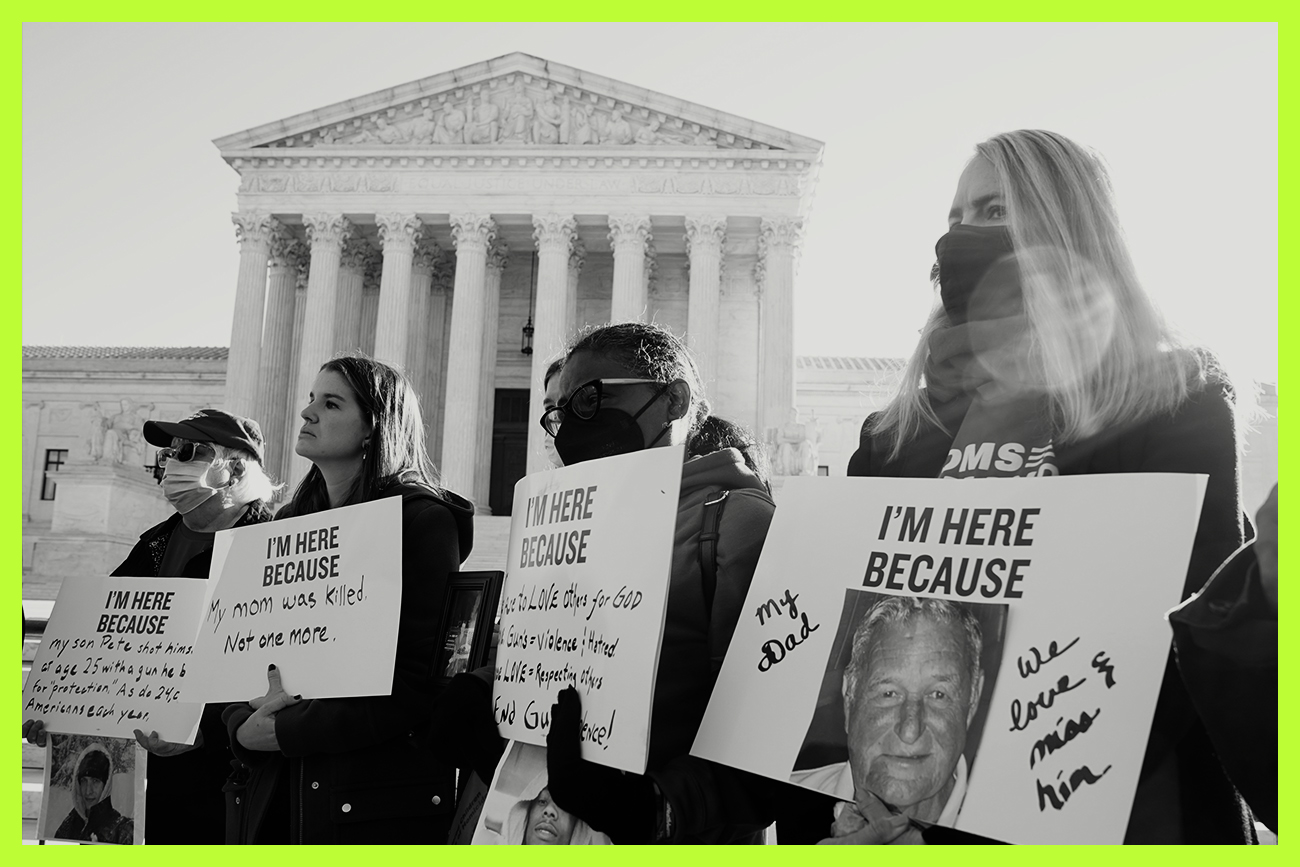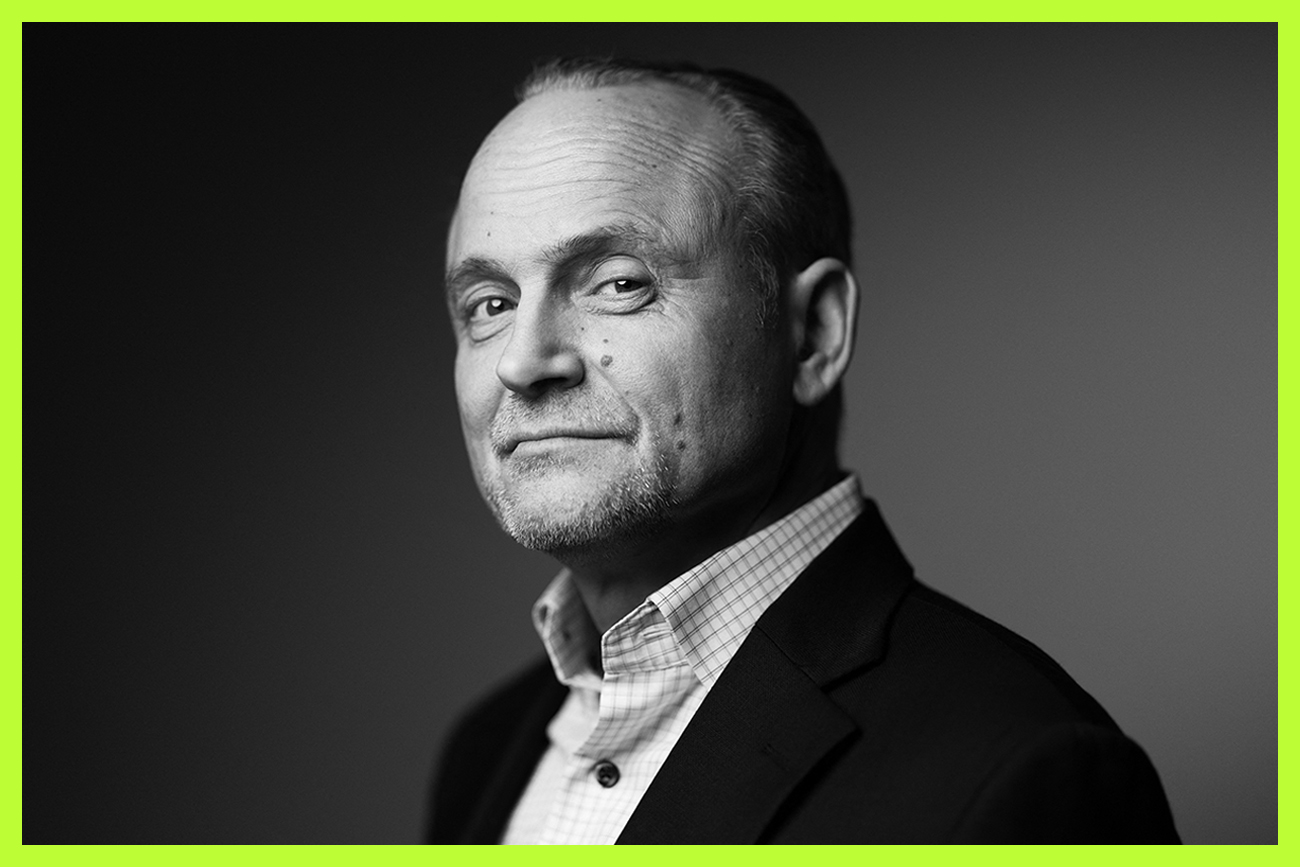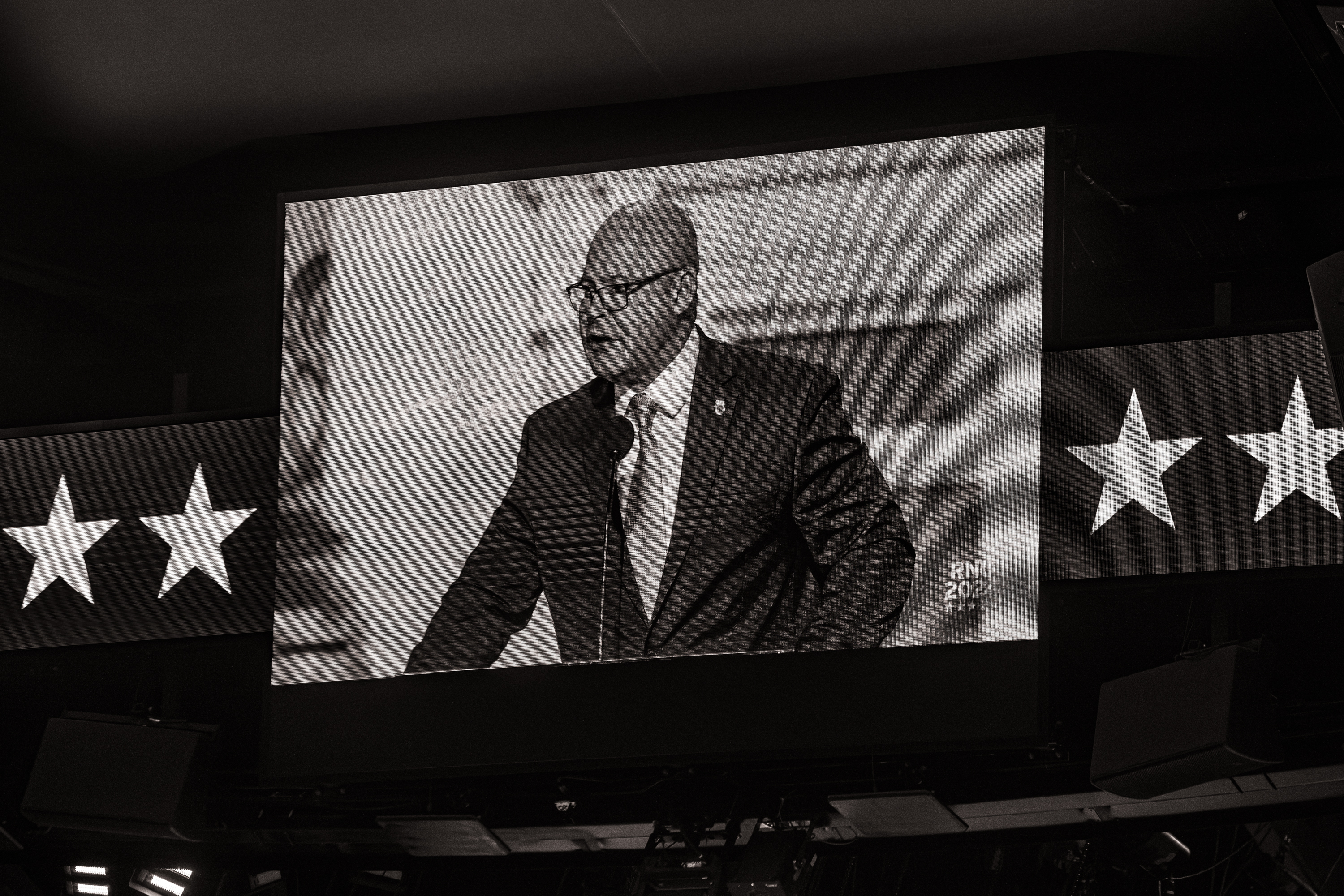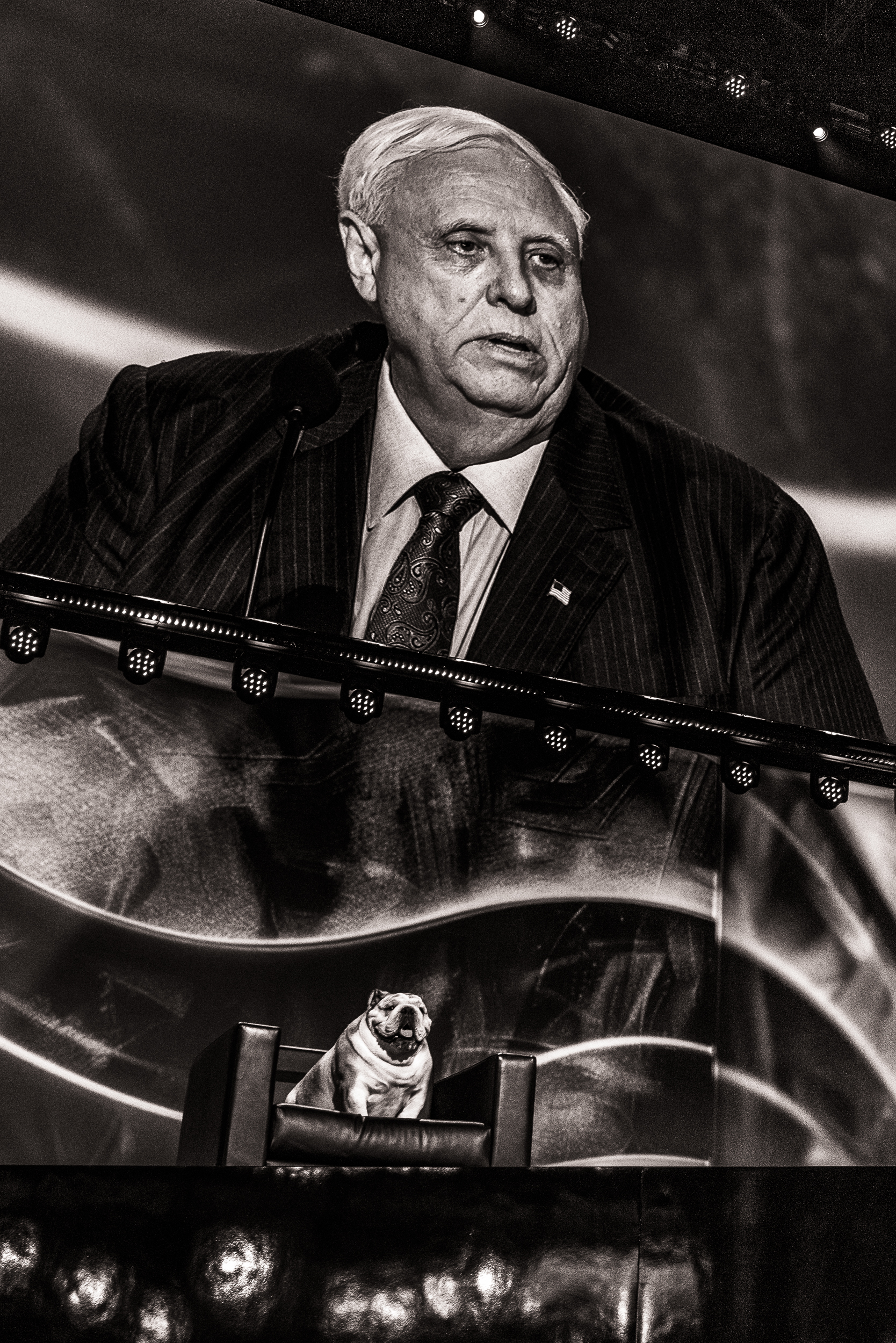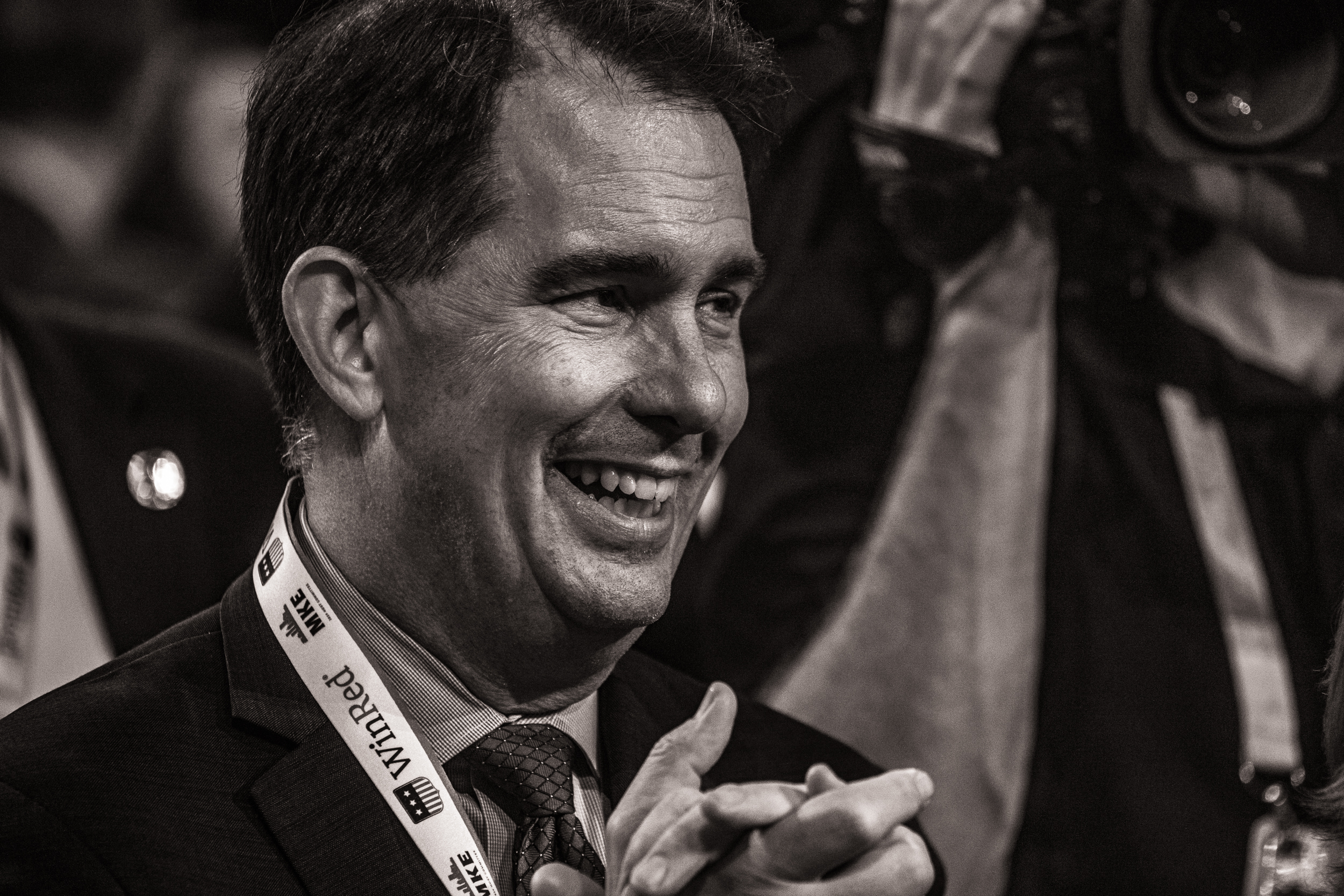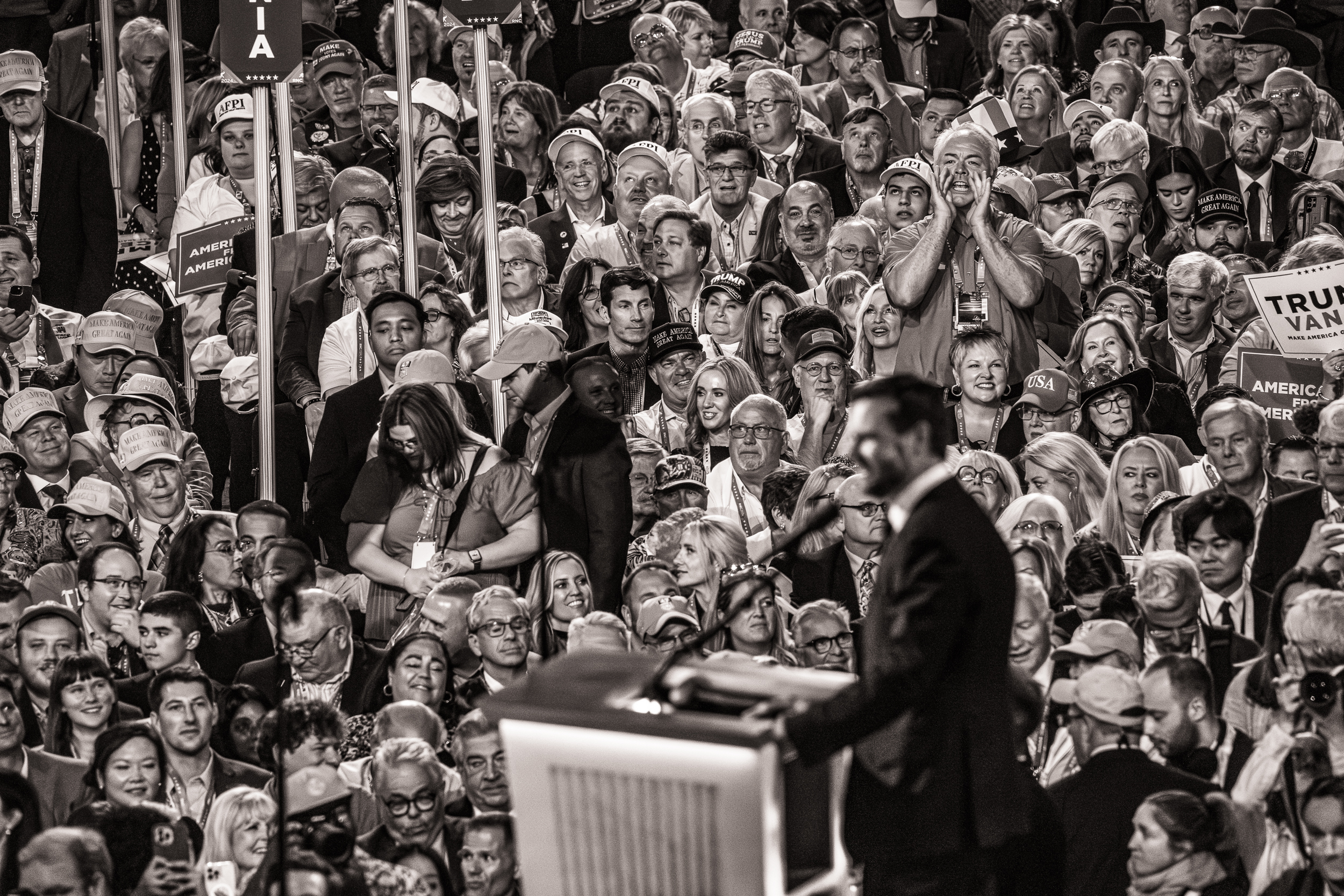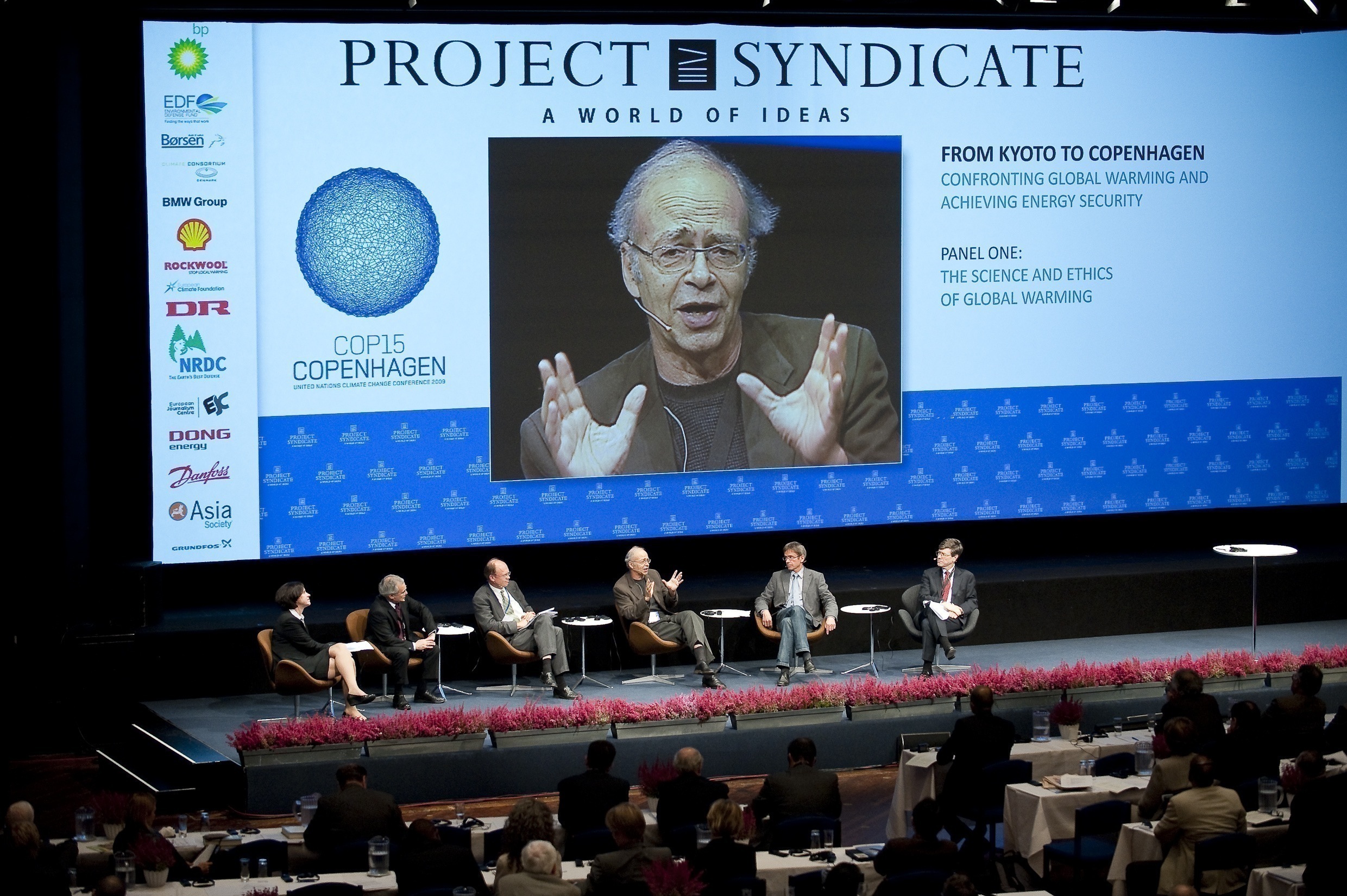To Understand JD Vance, You Need to Meet the “TheoBros”
On July 15, when former President Donald Trump first appeared at the Republican National Convention in Milwaukee, he brought along two new accessories. One was a large bandage covering his ear, which had been nicked by a would-be assassin’s bullet. The other was Ohio’s first-term senator and Hillbilly Elegy author JD Vance, who was about to debut as the GOP vice presidential hopeful.
Two days later, after paying tribute to his wife, Usha—the child of immigrants from India—and their three biracial kids, Vance portrayed a vision of America that resonated deeply with Trump voters. “America is not just an idea,” he said solemnly. “It is a group of people with a shared history and a common future. It is, in short, a nation.”
To many viewers at home, this seemed like the stuff of a boilerplate, patriotic stump speech. But the words “shared history” lit up a far-right evangelical corner of social media. “America is a particular place with a particular people,” Joel Webbon, a Texas pastor and podcaster, wrote on X. “This is one of the most important political questions facing America right now,” posted former Trump administration official William Wolfe. “Answer it wrong, we will go the way of Europe, where the native-born populations are being utterly displaced by third world migrants and Muslims. Answer it right, and we can renew America once more.”
Vance was embracing one of their most cherished beliefs: America should belong to Christians, and, more specifically, white ones. “The American nation is an actual historical people,” says Stephen Wolfe (no relation to William), the author of the 2022 book The Case for Christian Nationalism, “not just a hodgepodge of various ethnicities, but actually a place of settlement and rootedness.” For this group of evangelical leaders, Vance, a 40-year-old former Marine who waxes rapturous about masculinity and women’s revered role as mothers, was the perfect tribune to spread their gospel of patriarchal Christian nationalism.
For years, graying, khaki-clad evangelists have faithfully made the rounds at conservative events. However, as Wolfe, a 41-year-old former Princeton postdoc, writes in his book, these “men in wrinkled, short-sleeve golf shirts, sitting plump in their seats” are yesterday’s Christians. Among younger activists, they inspire the rolling of eyes—they are the embodiment of an ineffective boomer approach to taking over the United States for Jesus.
In their place, a group of young pastors hope to spearhead a Christian nationalist glow-up as they eagerly await a “Christian prince” to rule America. These often bearded thirty- and fortysomethings have suits that actually fit. They are extremely online, constantly posting on myriad platforms, broadcasting their YouTube shows from mancaves, and convening an endless stream of conferences for likeminded followers. Let’s call them, as one scholar I spoke with did, the TheoBros.
For all their youthful modishness, this group is actually more conservative than their older counterparts. Many TheoBros, for example, don’t think women belong in the pulpit or the voting booth—and even want to repeal the 19th Amendment. For some, prison reform would involve replacing incarceration with public flogging. Unlike more mainstream Christian nationalists, like House Speaker Mike Johnson, who are obsessed with the US Constitution, many TheoBros believe that the Constitution is dead and that we should be governed by the Ten Commandments.
In American Reformer, their unofficial magazine, hagiographies of Spanish dictator Francisco Franco appear alongside full-throated defenses of countries that execute gay people. On podcasts, the TheoBros unpack “the perils of multiculturalism,” expose “Burning Man’s wicked agenda,” and peel back the nefarious feminist plot of Taylor Swift. In Wolfe’s The Case for Christian Nationalism, one of their seminal texts, he writes that in an ideal Christian nation, heretics could be executed.
The rise of the TheoBros worries more mainstream religious conservatives. Janet Mefferd, a former Christian radio host and journalist who tracks their ascendancy, says her community is alarmed to see an extremist movement gaining traction. “I’m not sure what the endgame is, other than they want to advance Christian nationalism,” she says. “But a lot of us find that terrifying.”
“I’m not sure what the endgame is, other than they want to advance Christian nationalism—but a lot of us find that terrifying.”
The TheoBros’ strategy is bottom-up: They aim to convert small American towns into Christian enclaves. But it is also top-down: Some are working to position themselves close to the locus of federal power. Vance, a Catholic convert married to a Hindu, would seem an unlikely hero for a movement of devout Protestants who believe in a homogeneous America. But over the last few years, his political orbit has increasingly overlapped with that of the TheoBros—so much so that to careful observers, his public echoes of their ideas are beginning to sound less like coincidence and more like dog whistles.
And those dog whistles signal the major themes of this election: hypermasculinity, declining birthrates, ethnonationalism—and no small measure of carefully curated misogyny. If you want to know some of the actors who red-pilled Vance, or at least those who flock to him, you need to meet the TheoBros.
With no meetings, website, or an explicit statement of faith that unifies their beliefs, the TheoBros are not an official organization. They identify with 16th-century French theologian John Calvin, who spawned a rigid and deterministic form of Protestantism. Julie Ingersoll, a University of North Florida religion scholar, traces the current movement back to R.J. Rushdoony, an Armenian American philosopher who popularized the idea of Christian nationalism (and homeschooling) in the early 1970s.
Out of Rushdoony’s movement emerged two camps: the charismatic Christians, now known as the New Apostolic Reformation, and the reformed Protestants, which include the TheoBros. They share the goal of creating a Christian nation, says Ingersoll, but differ on a key point of theology: Adherents of the New Apostolic Reformation believe that God is still speaking directly to people through pastors who have declared themselves apostles and prophets. The TheoBros, meanwhile, believe that God said all he needed to say in the Bible.
Many TheoBros are also proponents of postmillennialism, the idea that believers can hasten Jesus’ return by fighting against the satanic forces of liberal excess. TheoBro Aaron Renn, an Accenture consultant turned Christian pundit, has described our current era as a “negative world,” where Christians are persecuted for their beliefs. Andrew Isker, another Bro, calls it “trashworld.”
Like all self-respecting millennials, the TheoBros have little tolerance for boomers, with the exception of their patriarch, Douglas Wilson, a 71-year-old pastor in Moscow, Idaho. When he was younger, Wilson imagined himself going into the family business—Christian bookstores—but after a stint in the military, he moved to Moscow in 1975 to study philosophy at the University of Idaho, where he became involved with the Jesus People, a kind of mashup of evangelical and hippie culture. He helped found Christ Church, the congregation over which he still presides and that regularly draws crowds of 1,300.
Wilson has since turned the college town into his own Christian kingdom. He helped found New Saint Andrews College, the Canon Press publishing house, and Logos School, one of the nation’s first classical Christian schools, where students exclusively study the Western canon. Wilson embraced Calvinism in 1988 and remade his church from the freewheeling Jesus People hub into something far more sober and buttoned-up, where women couldn’t be church leaders and the only music allowed was hymns and psalms. In the early 1990s, Wilson helped launch the Association of Classical Christian Schools, which had 502 member institutions across the United States as of March 2023.
“The sexual act cannot be made into an egalitarian pleasuring party. A man penetrates, conquers, colonizes, plants. A woman receives, surrenders, accepts.”
His influence over Moscow has not been without controversy. In a 2021 Vice exposé, former members of Christ Church alleged that ministers had encouraged them to stay in abusive relationships. That tracks with Wilson’s 1999 book, Fidelity: How to Be a One-Woman Man, in which he wrote, “The sexual act cannot be made into an egalitarian pleasuring party. A man penetrates, conquers, colonizes, plants. A woman receives, surrenders, accepts.” For that reason, Wilson wrote, the dynamic of a dominant man and a submissive woman is “an erotic necessity.” (Wilson called allegations of the church urging women to stay in abusive relationships “categorically false.”)
Wilson has also promoted another form of dominance. In the 1996 book Southern Slavery: As It Was, Wilson and his co-author argued that the master-slave dynamic was “a relationship based upon mutual affection and confidence,” and “there has never been a multi-racial society which has existed with such mutual intimacy and harmony in the history of the world” as that of the antebellum South. (In a 2020 blog post, Wilson said he now allows that while “the benevolent master is not a myth, the idea of the horrific taskmaster is no abolitionist myth either.”) When I asked Wilson about his controversial statements, he likened himself to a chef who strategically deploys jalapeno peppers: “Then some of my enemies online have combed through my writings, have gathered up all the jalapenos and put them on one Ritz cracker.”
In July, at the National Conservatism Conference in Washington, DC, Wilson shared the stage with Sens. Josh Hawley (R-Mo.), Ron Johnson (R-Wis.), and Mike Lee (R-Utah), as well as Vance, who auditioned his “America is a people” bit a week before his star turn at the GOP convention. Wilson agrees with Vance’s suggestion that children should be allotted votes, managed by their parents. “I would like to see elections where households vote,” he told me. Men, as the heads of households, would actually cast the votes. Though he believes that women’s suffrage was “a mistake,” he would allow a special exception for single mothers.
Wilson offered the crowd a few one-liners (“I’m a Presbyterian, not a Lesbyterian”), but mostly, he talked about the persecution of Christians. “It used to be that the sexually troubled had to keep their kinks hidden away in the closet,” he mused. “Now it is the conservative Christian who needs to keep his virtues hidden in the recesses of the closet.” After the National Conservatism Conference, Wilson appeared at the Believers’ Summit, which was headlined by Trump and hosted by the conservative political group Turning Point USA.
But it’s not just conferences and interviews with the likes of Tucker Carlson where Wilson promotes his ideas. He has a blog, a podcast, and a YouTube channel, thanks mostly to the urging of his children and younger colleagues. One example is that every year since 2018, Wilson has been celebrating what he calls No Quarter November: “The month where we say out loud what everyone is thinking.” In a 2023 video, which was the brainchild of one of his sons, Wilson sits at a sumptuously appointed Thanksgiving table, surrounded by his children and grandchildren, and addresses the camera. “If you think of my blog as a shotgun,” he says, “this is the month when I saw off all my typical, careful qualifications and blast away with a double-barreled shorty.” His wife, clad in an apron, brings out a turkey and places it in front of him, and then the tranquil scene is interrupted by a blaring alarm and a glowing red “perimeter breach” sign. Wilson excuses himself, heads to his garage, and straps on a flamethrower. After using it to light a cigar, he aims the fire at cardboard cutouts of Disney princesses Elsa and Ariel, and the logos of Instagram, TikTok, Twitter, and Netflix.
Wilson’s willingness to make campy content sets him apart, says Rachel Tabachnick, an extremism researcher who has been studying Christian nationalism for decades. “Instead of a crotchety old guy talking about stoning people, he’s like, super cool,” she says. “He’s witty.”
In subsequent videos, Wilson tackled women’s culpability in rape, the dark side of empathy, and the virtues of “something called the patriarchy—that which, according to our soi-disant and lisping political theorists, must be smashed. Only they say something like ‘thmasth.’”

Wilson has used his platforms to anoint the next generation of ultraconservative reformed Christian pastors, all of whom happened to be men. Mefferd, the conservative Christian journalist, told me that Wolfe’s The Case for Christian Nationalism got traction in mainstream Christian circles in part “because Doug Wilson endorsed.” Another Wilson protégé is Joel Webbon, a 38-year-old pastor who hosts a podcast and YouTube show, which he films from a wingback leather chair in a book-lined room.
Webbon wasn’t always reformed—he is an alumnus of a Bible school run by a New Apostolic Reformation affiliated outfit, which he now considers “straight-up heretical.” In his 20s, he broke from the group, moved to Texas, and started his own church. In a video from a few years ago, Webbon credited Wilson with emboldening him to say whatever he wanted—like telling a guest that the Founding Fathers weren’t responsible for the slave trade because Africans had done the actual kidnapping and enslaving.
“Kamala sees happy, large families and hates them. She wants them destroyed. She wants you to never be able to have this. She is a nasty, bitter harridan who hates all that is true, good, and beautiful.”
For Webbon, it was intensely liberating to watch Wilson speak in public without worrying about being canceled. “You stay in your little corner, you stay on your little leash, because you’re like, I don’t know what will happen,” Webbon said. “But when you see some other guy do it, and you’re like—that’s the worst thing that can happen? Vice writes an article about you? [Christianity Today editor-in-chief] Russell Moore won’t invite you to his birthday party anymore? Like, that’s it.” At a recent conference, he registered dismay over immigrants in his community. “It’s like full, straight-up Hindu garb at our neighborhood swimming pool, that my daughter is asking [about and] I’m trying to explain.”
In August, he remarked on his show that “a lot of people are gonna be surprised” when “you’re spending eternity worshipping Christ next to Stonewall Jackson and Robert E. Lee and Jonathan Edwards, and, you know, George Whitefield and Martin Luther King Jr.’s in hell.”
Webbon is so impressed by his own audacity that he maintains an online list of all the controversies in which he’s become embroiled. There, he explains why he called Christian men living in California “stupid” (they could just move to a red state); why he once ordered his wife to stop reading a book on theology (he didn’t want her exposed to beliefs that were different from his own); and why he believes in a patriarchal household structure (the Bible says so). Webbon, who is planning to host a conference in Texas next spring called “Christ Is King: How to Defeat Trashworld!” maintains that a “return to the Constitution is impossible” and that the only viable alternative is the Ten Commandments.
Some of Wilson’s other acolytes are attempting to create their own versions of Moscow, Idaho. Take Brian Sauvé, a 33-year-old Christian recording artist, podcaster, and pastor of Refuge Church in Ogden, Utah. Like Webbon, Sauvé wasn’t always reformed—Refuge began as a charismatic Christian church. After the lead pastor resigned in a scandal, the then-24-year-old Sauvé ascended to take his place, immersed himself in reformed theology, and moved the church in a new direction. Today, he presides over a Moscow-esque ecosystem: a publishing house called New Christendom Press, as well as St. Brendan’s Classical Christian Academy, modeled after those in Wilson’s network. “Can you feel it in the sails?” reads St. Brendan’s website. “The stiff breeze out of Moscow, Idaho? We can.”
On his three podcasts and to his more than 53,000 followers on X, Sauvé regularly states that women’s primary function is to bear children. In July, after Vance’s comments about “childless cat ladies who are miserable” began widely circulating, he posted: “It is desperately sad to think of all the intentionally barren women who will find themselves totally alone in their 50s, realizing their irreversible mistake. They will wish they could trade it all—money, vacations, independence, all of it—for children they can now never have.”
But unlike more mainstream conservatives, Sauvé does not even pretend to champion the idea of a Judeo-Christian nation. He posted in July, “[O]ur political system is heavily influenced by Jews who reject Christ and embrace all manner of evils.”
An even more well-connected Wilson emulator is Josh Abbotoy, executive director of American Reformer and managing partner of a venture capital fund and real estate firm called New Founding. A former fellow of the right-wing think tank the Claremont Institute, Abbotoy reported that he recently participated in a Project 2025 presidential transition “strategic planning session” hosted by the right-wing think tank the Heritage Foundation. Bucks County Beacon reporter Jennifer Cohn revealed venture capitalist Chris Buskirk was listed as the editor and publisher. In 2022, Buskirk co-founded the Rockbridge Network, a collection of powerful Trump donors including Catholic judicial kingmaker Leonard Leo and Silicon Valley billionaire Peter Thiel. Another co-founder of the Rockbridge Network? None other than JD Vance.
Thiel, Vance’s mentor and former employer, is also a major funder of the National Conservatism movement. Obsessed with global birthrates, Thiel spent $10 million on his protégé’s successful 2022 Senate campaign. In July, shortly after Trump had announced Vance as his running mate, Cohn surfaced a tweet by New Founding’s network director, Josh Clemans: a photo of Vance with several New Founding staffers. The caption read “Our guy.”
New Founding lists as a partner the Society for American Civic Renewal, a secretive fraternal order founded by Indiana shampoo baron Charles Haywood, who describes himself as an aspiring Christian “warlord.” According to founder Nate Fischer, New Founding wants to “form the backbone of a renewed American regime” and that its members “understand the nature of authority and its legitimate forceful exercise.” But its main public-facing project appears to be turning tracts of land in Appalachia into Christian communities. Promotional materials describe a community of “unmatched seclusion” where “simple country faith” protects local culture from rainbow flags and crime. Potential buyers, he advises, should not delay. “Who’s going to grab the land? Is it going to be good, based people who want to build something inspiring, something authentic to the region’s history, or is it going to be Bill Gates and BlackRock and hippies from California?”
One eager customer is 38-year-old TheoBro Andrew Isker—the pastor who interned at Wilson’s church, studied divinity at New Saint Andrews, and co-wrote a book on Christian nationalism with Andrew Torba, the openly antisemitic CEO of the social media platform Gab. In July, Isker announced on X that he planned to move his family of seven to lead a church in a New Founding community in Tennessee. Life in his native Minnesota, he said, had become untenable because of permissive laws around trans rights and abortion, not to mention how hospitable the state has been to refugees. “Minnesota is one of the top destinations for resettling foreign people hostile to our way of life,” he said.
That month, Isker spoke at a Texas conference about the “war on white America” alongside Paul Gottfried, the mentor of prominent white nationalist Richard Spencer. The conference was hosted by the True Texas Project, a far-right group with ties to Sen. Ted Cruz (R-Texas) and Texas Attorney General Ken Paxton.
Like many TheoBros, Isker sees much to like in Vance. In early July, before Trump announced his running mate, Isker referred to him as “Senator JD Vance (R-Heritage America).” In late July, he posted a video of Vance and told his 29,000 followers, “You need to double down on childless cat lady discourse. Kamala sees happy, large families and hates them. She wants them destroyed. She wants you to never be able to have this. She is a nasty, bitter harridan who hates all that is true, good, and beautiful.”
One problem is that there simply are not enough TheoBros to populate Christian communities like the one Isker plans to move to. Enter William Wolfe, the founder of the Center for Baptist Leadership, which aims to persuade members of the Southern Baptist Convention that it, the largest of all Protestant denominations in the United States, has fallen prey to the corrupting forces of liberalism. Baptists are only the beginning. Wolfe wants to win over the entire evangelical mainstream, which he and other TheoBros refer to as “Big Eva.” In August, he posted on X, “Once you realize that Big Eva thinks it’s a bigger sin to desire to preserve the customs, heritage, values, and cultural homogeneity of your own nation than to kill the unborn in the womb, you can better understand their moral framework.”
Wolfe served in the Trump administration both as the deputy assistant secretary of defense and as director of House affairs at the Department of State. He is also an alumnus of Heritage Action, a sister organization of the Heritage Foundation, the arch-conservative think tank behind Project 2025, whose chief architect, Russell Vought, posted on X that he was “proud to work with @William_E_Wolfe on scoping out a sound Christian Nationalism.” A few months later, the Bucks County Beacon uncovered a lengthy online manifesto on the goals of Christian nationalists. The document, which listed Wolfe and Joel Webbon as contributing editors and Oklahoma Sen. Dusty Deevers as a co-author, called for “civil magistrates” to usher in “the establishment of the Ten Commandments as the foundational law of the nation.”
The manifesto doesn’t specify exactly how Christian nationalists should achieve these goals. As Tabachnick, the extremism researcher, interprets it, the TheoBros are imagining a utopia where “they are going to be free to be entrepreneurs in all different senses, including the tech world that they’re mixing with so freely.” The key, she said, is that authoritarianism “is required to have the utopian vision.”
Last year, the extremism watchdog group Right Wing Watch posted a video of Wolfe quoting a scripture passage. There are times when “even the God of peace proclaims by his providence, ‘to arms!’” he says. “If we have ever lived in a point of time in American history since then that we could argue that now is a time ‘to arms’ again, I think we are getting close.”
William Wolfe’s Christian nationalism manifesto made the rounds on social media, but in mainstream conservative outlets, it was Stephen Wolfe who brought TheoBro ideas to the wider world. In his book, which was praised by editors at the Federalist and the American Conservative, Wolfe paints America as a “gynocracy” whose government and culture have been feminized by unhappy women leaders. (Sound familiar?) He has stated on X that women should not have the right to vote, and that “interethnic” marriage can be “sinful.”
Wolfe grew up in Napa, California, and his father was an admirer of the right-wing pundit and erstwhile GOP presidential candidate Pat Buchanan. After attending West Point and serving in the Army, Wolfe earned advanced degrees before leaving academia to “do the Wendell Berry thing” in North Carolina with his wife and four kids.
Over the summer, Wolfe, 41, agreed to speak with me on the condition that I refer to him as “Dr. Wolfe” and call him an “expert on Christian nationalism.” The Dr. Wolfe I spoke with was a more muted version of the firebrand I’d watched online. He said his ideal version of America would be led by a Caesar figure. Gay marriage would be strictly prohibited. Women would not be allowed to vote—instead, men would vote for their households.
When I brought up the bit from his book about heretics being killed, he grew annoyed. “I do think it’s permissible, in principle, for a state to suppress theological heresy, but that doesn’t mean that it’s prudent or proper, suitable in every circumstance or every tradition or way of life.” The Founding Fathers, he added, had encouraged religious liberty, so killing heretics would not be appropriate in the United States that we inhabit.
We turned to remarks he had made at a recent conference convened by Brian Sauvé: “I think we need to reflect on this idea of Judeo-Christianity, or Judeo-Christian worldview, or Judeo-Christian whatever, and really eradicate that from our thinking. Because if we say that America is a Judeo-Christian country, then it can’t be a Christian country, okay?” What role, I asked him, would Jews play? After a deep sigh, he told me that they would be allowed to “exercise their religion freely.”
“We need to reflect on this idea of Judeo-Christianity, or Judeo-Christian worldview, or Judeo-Christian whatever, and really eradicate that from our thinking. Because if we say that America is a Judeo-Christian country, then it can’t be a Christian country, okay?”
We spoke a week before Vance’s RNC speech, and Wolfe’s remarks helped me understand what the TheoBros heard in Vance’s phrase about America as a people. The founders, Wolfe noted, intended for their country to be “Anglo-Protestant with an American inflection.” America, he continued, is “a place of settlement and rootedness, but it’s an open ethnicity in which people can become one of us.” Which is to say that, like some others, Wolfe is not necessarily opposed to the idea of nonwhite people in America—as long as they agree to assimilate to the Anglo-Protestant dominant culture.
In this telling, America is not a pluralistic society at all, but rather one in which there exists an uneasy truce between Christians and those they reluctantly tolerate. Toward the end of our conversation, I asked Wolfe what motivated him. “I want Christians to be more assertive and to recognize the Christian heritage of the American way of life, and to seek to restore that,” he said. “This is a Christian country, and we’ve got to work to restore it to what it once was.”
In his keynote address at Sauvé’s conference, titled “Why Multicultural Pluralism Fails and What to Build Instead,” Wolfe called the concept of America as a melting pot “an early 20th-century idea cooked up by a Jew in New York who despised the confident Anglo-Protestant establishment.” WASPs were the “distinct ethnicity” of America, he insisted, and America should only welcome those who aspired to assimilate. As he put it, “This is our homeland, and we welcome you on the condition of conformity.” Or, in the words of JD Vance, America “is a group of people.”
Correction, September 19: An earlier version of this article incorrectly described Chris Buskirk’s role at American Reformer.




